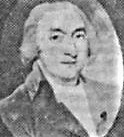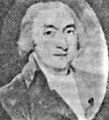Thomas Ledlie Birch facts for kids
Quick facts for kids
Reverend
Thomas Ledlie Birch
|
|
|---|---|
 |
|
| Born | 1754 Gilford, County Down, Kingdom of Ireland
|
| Died | 1828 |
| Nationality | |
| Occupation | Presbyterian Church Minister |
|
Notable work
|
A Letter from an Irish Emigrant (1799) |
| Movement | |
| Criminal charge(s) | Treason 1797, 1798 |
Thomas Ledlie Birch (1754–1828) was an Irish Presbyterian minister who believed strongly in democracy and fairness for everyone. He was a key figure in the Society of United Irishmen, a group that wanted Ireland to be an independent republic. After a major rebellion in 1798, he was forced to leave Ireland and move to America. There, he wrote an important letter called A Letter from An Irish Emigrant (1799). This letter was the first public defense of the United Irishmen's fight for independence.
Contents
Early Life and Education
Thomas Ledlie Birch was born in 1754 in County Down, Ireland. He was the youngest of six sons in a family of farmers and merchants. He went to the University of Glasgow in Scotland to study. In 1776, he became a Presbyterian minister in Saintfield, a town with one of the largest Presbyterian communities in Ireland. In 1783, he married Isabella Ledlie.
While studying in Glasgow, Birch learned about new ideas from the Scottish enlightenment. These ideas made him feel even more strongly about the American colonists' fight for independence from Britain. In 1784, he sent a letter to George Washington, the leader of the American Revolution. In this letter, Birch shared the joy of his local club in Ireland that Americans had won their freedom. He believed America's success could inspire Ireland to seek its own freedom. Washington thanked him for his support.
Fighting for Change in Ireland
When the American Revolutionary War was happening, a group called the Irish Volunteers formed in Ireland. They were meant to defend Ireland from a possible French invasion. Birch saw this as a chance to push for more political rights for ordinary people. At the time, only a few powerful families controlled the Irish Parliament. He became a chaplain for the Saintfield Light Infantry, a part of the Volunteers, and even called his home "Liberty Hall."
Birch worked with other Volunteers to support candidates in local elections who wanted change. However, he soon became disappointed with the political system. He realized that real change would only happen if Protestants and Catholics worked together.
In 1792, Birch joined the Society of United Irishmen. This group wanted to unite all Irish people, regardless of their religion, to achieve a more democratic and independent Ireland. Birch strongly supported giving full rights to Catholics, who were often treated unfairly. He believed it was "criminally unjust" to deny rights to Catholic people.
Birch's Ideas for Saintfield
On Christmas Eve in 1792, Birch led the Saintfield Society of United Irishmen in making their first important statements. His church congregation also supported these ideas. They even suggested adding 500 more people to the "National Guards" (the Volunteers) to protect their families and property.
Birch often spoke from the pulpit about a future time of peace and happiness for the world. He also believed that people lived in an "enlightened period" where old ways of thinking were disappearing. He felt it was his duty as a minister to speak out against unfair government.
He told Wolfe Tone, a leader of the United Irishmen, that his congregation fully agreed with his views. They even celebrated French victories against other European armies. However, some people in his congregation disagreed with his strong republican ideas and left the church.
The 1798 Rebellion and Exile
In 1797, some of Birch's church members were accused of attacking a loyalist family. They were found not guilty, partly because of the skilled defense lawyer, John Philpot Curran. During the trial, Birch himself was arrested for treason, a very serious crime against the government. However, the judge found the accusations against him unfair and he was released.
Birch joined the rebel army in County Down on June 8, 1798. He was a chaplain for the United Irish Army. His group, about a thousand strong, attacked the McKee family's home, which was set on fire. A group of government soldiers tried to help but were ambushed and had to retreat.
After a major battle in Ballynahinch on June 13, Birch went back to his home in Saintfield. He was arrested there on June 16. He faced a military trial in Lisburn. His brother helped him, and Birch agreed to leave Ireland and go to the United States to avoid a harsher punishment.
After spending some weeks on a prison ship, Birch sailed to New York City in August 1798. Many other Irish people who had supported the rebellion were also on the ship.
A Letter from An Irish Emigrant
Birch likely started writing his important letter, A Letter from An Irish Emigrant, during his journey across the Atlantic Ocean. It was published in Philadelphia in November 1798. In America, many Irish immigrants supported democratic ideas and were against the Federalist Party, which favored closer ties with Britain.
Birch's letter was written for an American audience. He wanted to explain the Irish rebellion and counter any negative stories about it. He wrote about the "unnatural war" that Irish Presbyterians had been forced to fight against their "brethren" in America. He said that Irish people only wanted to be treated fairly, like American citizens, and have the right to choose their own leaders. He believed that nothing less than a republican government would satisfy them.
Birch also wrote that the Irish people felt inspired by a belief that the time had come for a "Universal Dominion of Christ's Kingdom" and a "peaceful happy state" on Earth.
Later Years in America
In the United States, Birch continued his work as a minister. He served in Philadelphia and later in Allegheny County, Pennsylvania. However, he faced disagreements with the local Presbyterian leaders there.
The leaders in Ohio did not like Birch's strong democratic views, especially his support for Thomas Jefferson and his political party. Many local leaders and church elders supported the opposing party. Birch was also criticized for his different religious beliefs. He believed in traditional Presbyterian teachings and did not like the new "revivalism" movement, which focused more on personal religious experiences. The local church leaders repeatedly said Birch was "unconverted."
Birch may have seen similarities between the American revivalism and a group in Ireland called the "Seceders." He had criticized the Seceders in Ireland for their outdoor religious gatherings and their conservative politics.
In 1804, Birch bought a farm near Washington, Pennsylvania. He continued to officiate at weddings there. He passed away near Freeport, Pennsylvania in 1828. His wife, Isabella, died in Cadiz, Ohio in 1836, and their son Hamilton died there in 1847.
Images for kids
 | Jessica Watkins |
 | Robert Henry Lawrence Jr. |
 | Mae Jemison |
 | Sian Proctor |
 | Guion Bluford |



